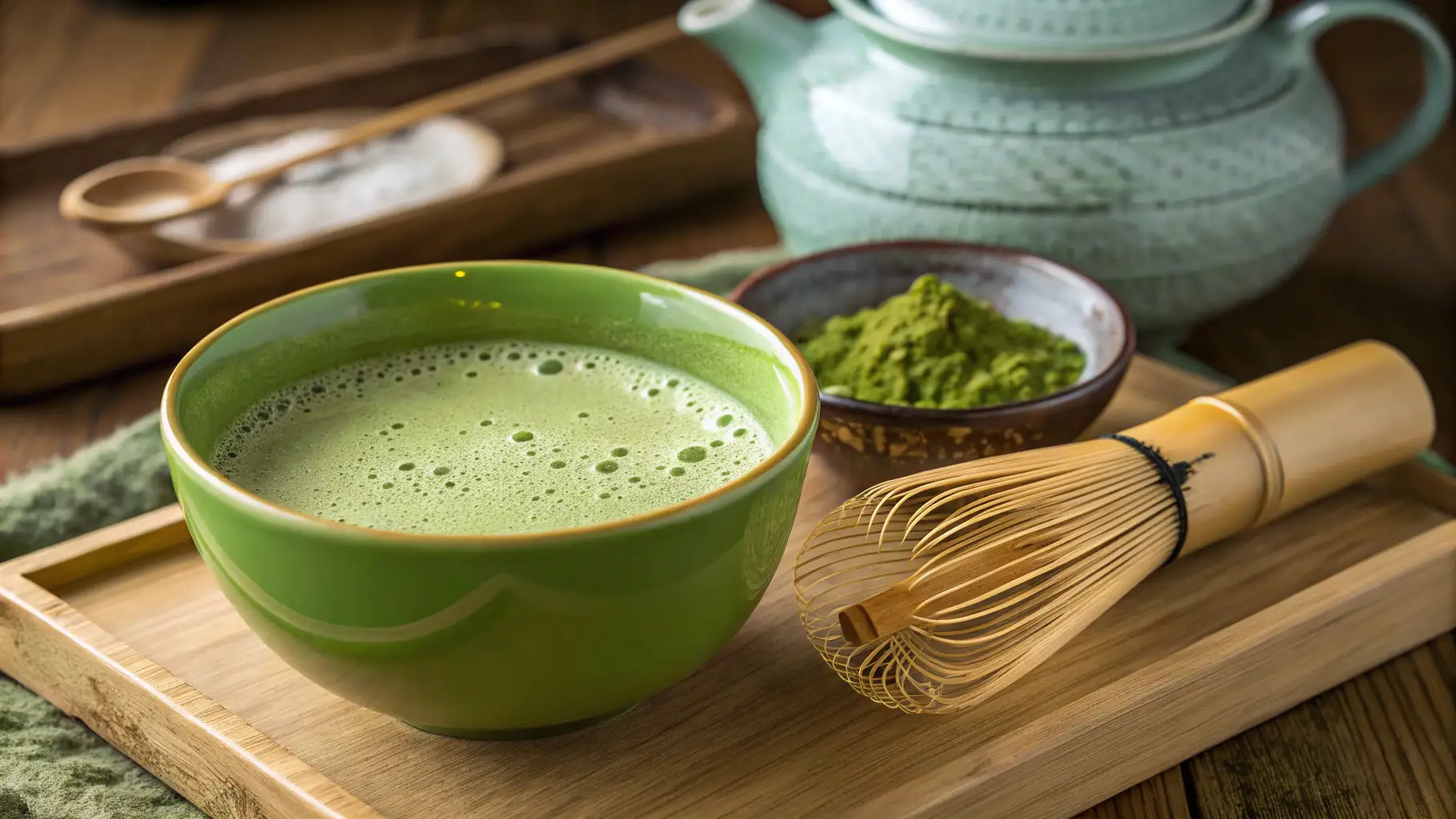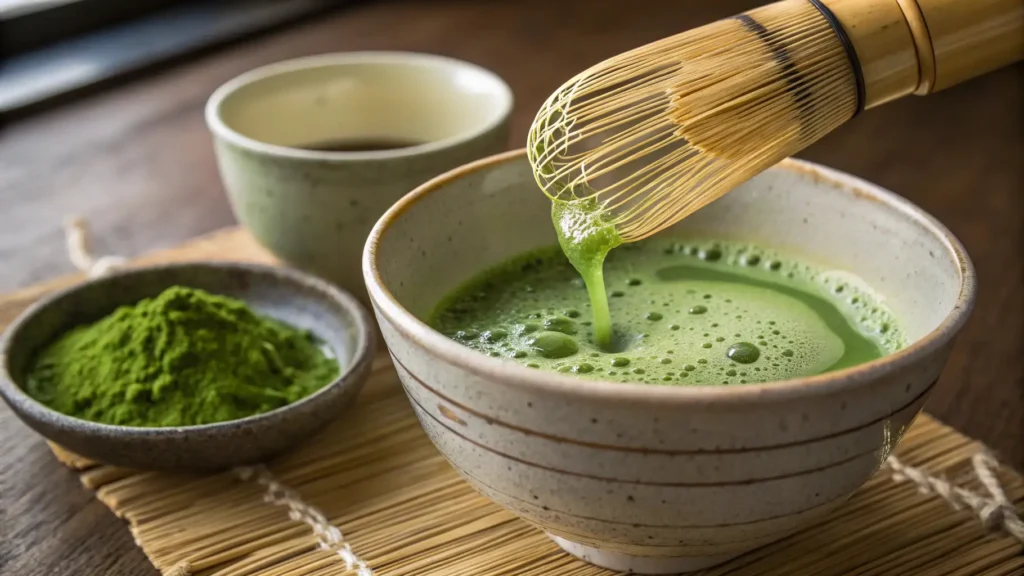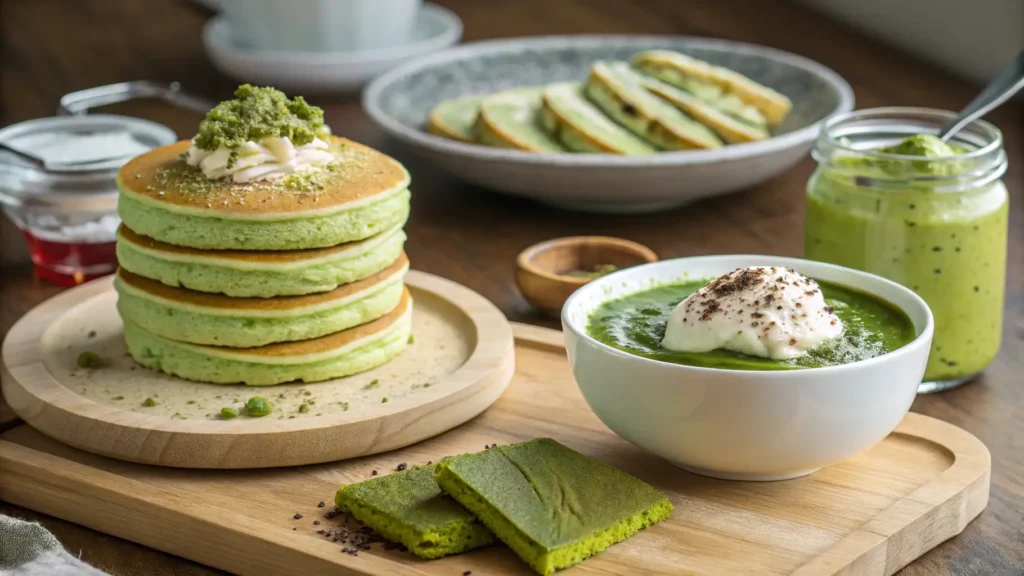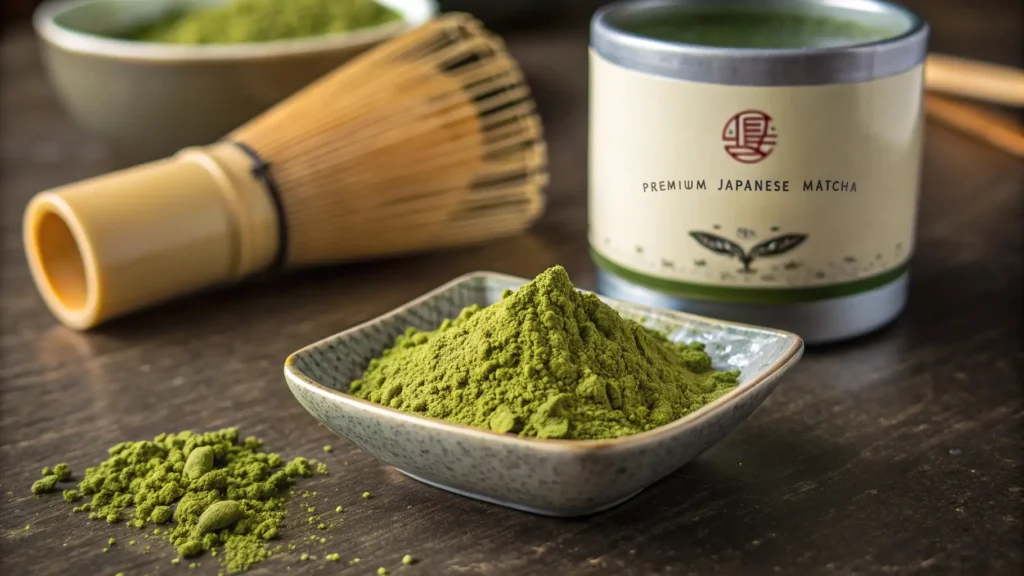Matcha green tea has become a beloved superfood for good reason. This finely ground powder, made from specially grown green tea leaves, is packed with nutrients, offers numerous health benefits, and can be used in countless recipes. Whether you’re sipping it traditionally or incorporating it into desserts, matcha is a flavorful, energizing, and versatile ingredient.

What Is Matcha Green Tea?
Matcha is a type of powdered green tea originating in Japan. Unlike traditional green tea, where leaves are steeped and discarded, matcha involves consuming the entire leaf, making it more nutrient-dense and flavorful.
How Is Matcha Made?
- Shading the Plants: Tea plants are shaded for about three weeks before harvest to increase chlorophyll and amino acid content.
- Harvesting the Best Leaves: Only the youngest and highest-quality leaves are picked.
- Processing: The leaves are steamed, dried, and ground into a fine powder using stone mills.
Pro Tip: Always store matcha in an airtight container to preserve its vibrant green color and fresh flavor.
Health Benefits of Matcha Green Tea
Matcha green tea is not only delicious but also a nutritional powerhouse with numerous health benefits. Whether you’re looking to boost energy, manage weight, or improve your overall well-being, matcha can be an excellent addition to your daily routine.
1. High in Antioxidants
One of matcha’s standout qualities is its abundance of antioxidants, particularly catechins. These powerful compounds help protect the body from free radicals, unstable molecules that can cause oxidative stress and damage cells over time.
Why It Matters: By reducing oxidative stress, antioxidants can improve skin health, promote heart health, and lower the risk of chronic diseases like diabetes and cancer. For those prioritizing long-term wellness, incorporating matcha into your diet is a simple and effective way to enhance your antioxidant intake.
Comparison: Matcha contains significantly more antioxidants than regular green tea because you consume the entire tea leaf. In fact, studies suggest that matcha offers up to 137 times the antioxidant content of standard brewed green tea, making it a potent ally for your body’s defenses.
Pro Tip: Pair your matcha with a healthy breakfast, like this Healthy Breakfast Burrito, to start your morning on a nutrient-packed note.
2. Boosts Energy and Focus
While matcha contains caffeine, its effects are quite different from the jittery energy often associated with coffee. The secret lies in L-theanine, an amino acid unique to matcha that promotes relaxation and mental clarity.
What It Does: The combination of caffeine and L-theanine provides a calm and sustained energy boost, making it easier to stay focused and productive throughout the day. Many people turn to matcha as a coffee alternative because it delivers sharper concentration without the midday crash.
When to Drink: Matcha is particularly effective in the morning or early afternoon when you need an energy boost for work, exercise, or study sessions.
3. Aids in Weight Management
Matcha’s reputation as a weight-loss aid is well-deserved, thanks to its ability to enhance metabolism and fat oxidation.
Why It Helps: The catechins in matcha, combined with its caffeine content, can stimulate thermogenesis, the process by which your body burns calories to produce heat. Drinking matcha before exercise has been shown to increase fat-burning by up to 17%, making it a popular pre-workout beverage.
How to Use It: Incorporate matcha into your weight-loss plan by pairing it with a balanced diet and regular physical activity. A refreshing matcha smoothie or latte can be the perfect way to fuel your workouts.
Pro Tip: For a hearty yet weight-conscious breakfast pairing, try this Healthy Breakfast Casserole alongside your matcha for sustained energy.
4. Supports Detoxification of Matcha Green Tea
Matcha’s vivid green hue is more than just visually appealing—it reflects its high chlorophyll content, which plays a significant role in detoxifying the body.
How It Works: Chlorophyll Matcha Green Tea helps eliminate heavy metals, toxins, and harmful chemicals from the body. This natural detoxification process can improve digestion, boost energy levels, and promote overall health.
Why It’s Effective: Unlike other detox solutions, Matcha Green Tea provides a gentle yet effective cleanse without causing discomfort or disruption to your daily routine.
Pro Tip: For an added detox boost, pair matcha with fiber-rich meals like oatmeal or chia seed pudding.
5. Strengthens the Immune System
Why It’s Beneficial: Regular consumption of matcha can help the body fight off infections, reduce inflammation, and speed up recovery from illness. Its high antioxidant content further aids in protecting the immune system from oxidative stress.
How to Incorporate It: Sip on a warm matcha latte when you’re feeling under the weather, or mix matcha powder into smoothies loaded with fresh fruits and vegetables for an immunity-boosting treat.
How to Prepare Matcha Green Tea
Traditional Method

Traditional Method of Matcha Green Tea
To prepare matcha green tea the traditional way, follow these simple steps for a smooth, frothy, and flavorful cup.
Sift the Powder: Use a fine mesh strainer to sift 1–2 teaspoons of matcha powder into a bowl. This step prevents lumps and ensures a smooth, even consistency when whisking.
Add Water: Slowly pour 2–3 ounces of hot water (175°F) into the sifted powder. Using water that’s too hot can make the tea bitter, so it’s best to let it cool slightly after boiling.
Whisk: Use a bamboo whisk (chasen) to mix the tea in a quick “M” or “W” motion until it becomes frothy. This aerates the tea, enhancing the flavor and creating a light, velvety texture.
Serve: Enjoy matcha as is for a pure, traditional experience, or add warm milk for a soothing matcha latte.
Modern Variations Matcha Green Tea
While the traditional method highlights the pure, earthy flavor of matcha, modern variations allow for creative twists to suit different preferences.
Matcha Latte: Mix prepared matcha with steamed almond, oat, or dairy milk for a creamy, slightly sweet drink. A touch of honey or vanilla enhances the flavor.
Iced Matcha: Combine matcha with cold water and ice, then shake or blend for a refreshing and energizingsummer drink.
Smoothies: Add matcha powder to smoothies for a boost of antioxidants, energy, and earthy flavor. It pairs well with banana, spinach, vanilla protein powder, or coconut milk for a nutritious upgrade.
By experimenting with different matcha preparations, you can enjoy its vibrant, energizing qualities in a variety of ways, whether you prefer it hot, iced, or blended into a smoothie!
Pair your matcha latte with this Blueberry Compote Recipe for a flavorful combination.
Creative Ways to Use Matcha
Matcha isn’t just for tea—it’s a versatile ingredient in the kitchen.

1. Breakfasts
- Pancakes: Add a teaspoon of matcha to pancake batter.
- Overnight Oats: Stir matcha into oats with almond milk for a quick breakfast.
2. Desserts
- Cookies and Cakes: Matcha adds flavor and color to baked goods.
- Ice Cream: Homemade matcha ice cream is a refreshing dessert.
Complete your dessert spread with ideas from What to Serve with Tortellini Alfredo.
3. Savory Dishes
- Salad Dressings: Combine matcha powder with olive oil, lemon juice, and honey for a light and tangy salad dressing.
- Soups: Stir a pinch of matcha into creamy soups like potato or zucchini for an earthy depth of flavor.
- Matcha Salt: Mix matcha powder with sea salt and sprinkle it over roasted vegetables or grilled meats for a unique twist.
If you’re exploring versatile toppings for salads or breakfasts, you might also enjoy Blueberry Compote Recipe, a fruity pairing option for any meal.
Tips for Choosing the Best Matcha Green Tea

1. Look for Vibrant Color
High-quality matcha has a bright, vibrant green hue, indicating fresh, nutrient-rich tea leaves. If the powder looks dull or brownish, it’s likely of lower quality.
2. Choose the Right Grade
Matcha is categorized into two main grades:
- Ceremonial Grade: Perfect for drinking due to its smooth flavor.
- Culinary Grade: Ideal for cooking and baking, as it has a slightly stronger taste to balance other ingredients.
For recipes that require attention to flavor profiles, like How to Make Sophia Loren Pasta, culinary-grade matcha ensures the perfect balance.
3. Check the Origin
The best matcha typically comes from Japan, with regions like Uji and Nishio being renowned for their high-quality tea production.
FAQs About Matcha Green Tea
1. Is matcha green tea good for weight loss?
Yes! Matcha contains catechins and caffeine, which can boost metabolism and aid in fat-burning, especially when combined with a healthy diet.
For breakfast options to complement your weight-loss journey, check out Healthy Breakfast Burrito, which pairs well with matcha for a balanced start to the day.
2. Can I use matcha in baking?
Absolutely! Matcha works wonderfully in cookies, cakes, and muffins. Its vibrant color and earthy flavor make it a standout ingredient in desserts.
3. Does matcha contain more caffeine than coffee?
No, matcha contains less caffeine than coffee. However, the presence of L-theanine in matcha promotes calm energy, providing a more balanced boost.
4. What’s the best way to store matcha?
Keep matcha in an airtight container and store it in a cool, dark place. This preserves its flavor and bright color.
Conclusion
Matcha green tea is more than a trendy beverage—it’s a powerhouse of nutrients, antioxidants, and culinary possibilities. Whether you enjoy it as a frothy latte, use it in desserts, or experiment with savory dishes, matcha offers something for everyone.
By choosing high-quality matcha and exploring its versatility, you can add vibrant flavor and health benefits to your daily routine. Try pairing it with complementary recipes like Why Is My Breakfast Casserole Soggy? for a delightful morning spread.
